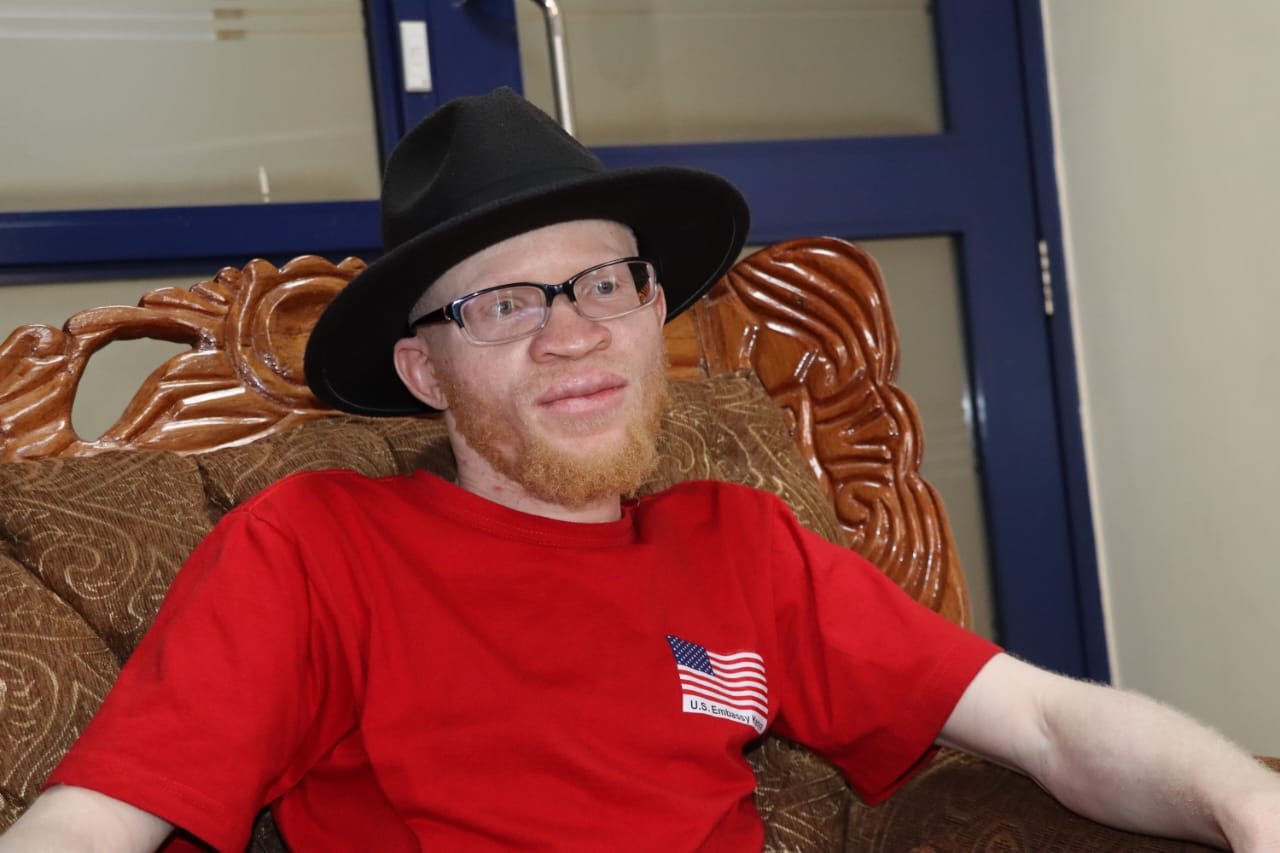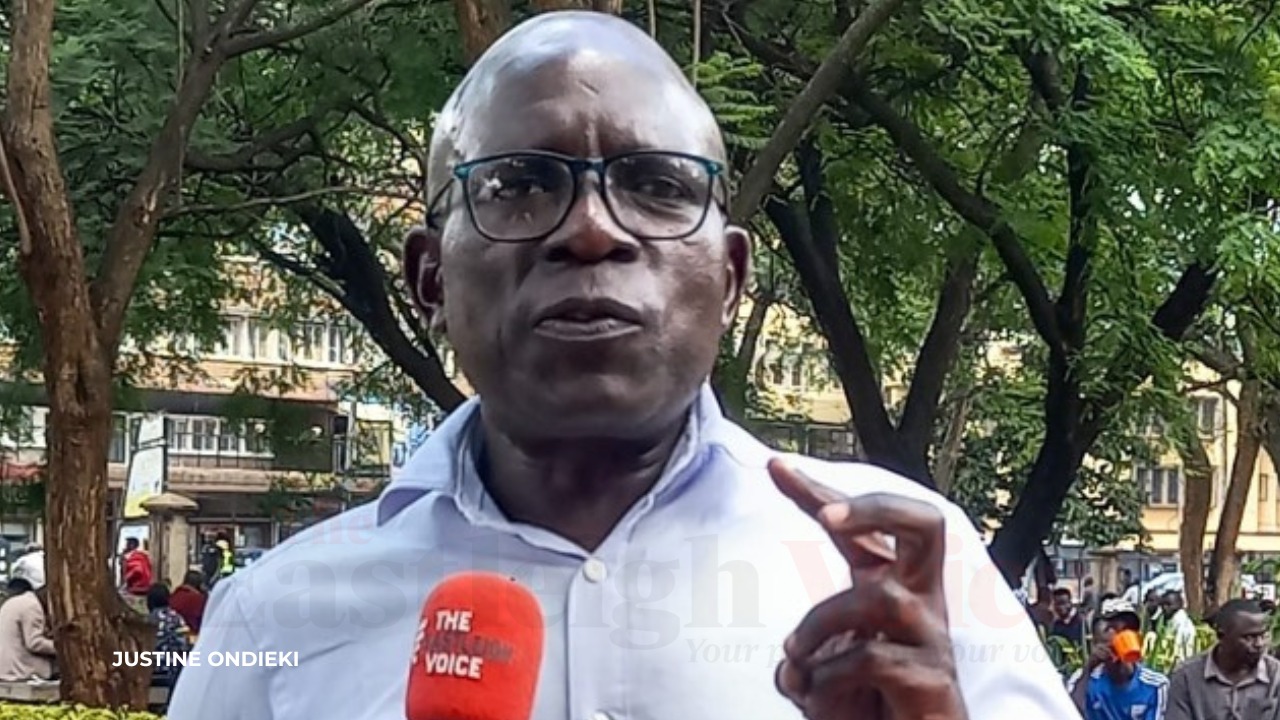Meshack Wekesa rises from albinism stigma to inspiring change through music

Some people had even labelled his condition a curse, while others sought to exploit him for superstitious purposes.
Meshack Wekesa, now 24, has often found himself sitting alone at social events, feeling invisible as people ignored him simply because he has albinism.
Some people had even labelled his condition a curse, while others sought to exploit him for superstitious purposes. During his secondary school years, he faced the chilling threat of being sold, an experience that stung deeply and nearly shattered his dream of education.
More To Read
- Less than 40 per cent of counties cover health costs for persons with disabilities - report
- Senate demands swift compliance with disability access in public offices
- Kenya Power awards Sh3.5 billion in tenders to youth, women and PWDs
- Only 4 per cent of public institutions meet disability hiring quota - survey
- Beyond the numbers: Why Kenya’s teenage pregnancy crisis demands new conversations
- Persons with Disabilities Act 2025 explained: Mocking PWDs punishable by law
"In high school, my albinism made me feel like an outcast. I was often excluded from games and sports, which left me feeling isolated and resentful of school. To escape that loneliness, I frequently pretended to be sick just to spend time with friends at home."
Childhood Support and Secondary School Struggles
Born into a family of three, Meshack is the only one with albinism. His family did everything possible to support him and help him feel special throughout his primary school years, building his confidence and sense of self-worth.
However, things took a sharp turn when he entered secondary school. There, his peers and even teachers reminded him constantly of his differences, labelling him as disabled. This continuous reminder eroded his self-esteem and changed how he viewed himself.
One of the most traumatic incidents he recalls occurred during a school cross-country run, where a stranger threatened to kidnap him and sell him in Tanzania for rituals. The fear that this incident triggered had a profound impact on his mental health.
"Every day, I would imagine that man's gaze on me, and feelings of worthlessness consumed me. I began to doubt my value as a person. That moment truly shook me to my core and shattered my sense of self-worth."
Dropping Out and Family Tensions
After this experience, Meshack never felt safe, and he confided in nobody. His mind was consumed with plans to transfer to another school, but his mother, though always supportive, could not accommodate this desire. The tension between them grew until it culminated in a three-month period where they did not speak to each other.
For those three months, Meshack stayed at home, lost in thought about his future. He avoided discussing his decision with his mother, who believed he should return to the same school since she had already paid the fees. However, he felt trapped and unwilling to share the true reasons behind his reluctance, which led to a state of misunderstanding and strain between them.
During this time of introspection, Meshack decided to take control of his life. He wrote a heartfelt letter to his mother, expressing his feelings of shame and asking for forgiveness.
Moved by his sincerity, she agreed to let him return to school. In 2017, Meshack enrolled at Mitoto Secondary School, an integrated institution.
Finding Purpose Through Music
"At Mitito, I found my love for music, sparked by a friend's suggestion. Together, we wrote a song that tackled the myths surrounding albinism, and its positive reception motivated us to use music and art as tools for raising awareness about disabilities and mental health. With the invaluable support of teachers like Principal Mr Joseph Kamanda, we began our mission to foster change."
What started as a simple idea to promote understanding of disabilities and mental health soon grew into a powerful movement for change. Meshack’s determination and commitment helped to build a culture of inclusivity and acceptance within his school community, earning him recognition for his efforts.
"During my high school years, many classmates with disabilities struggled significantly. Their parents often assumed that the school met all their needs, leading to a lack of support that resulted in feelings of self-hatred among many students."
Creative Expression as a Tool for Change
To combat these challenges, Meshack and his friends would meet at the school chapel on weekends, where they engaged in various creative activities like dance, music, and drama. These gatherings offered a much-needed outlet for self-expression, and even the school church allowed them to showcase their talents on Sundays.
These activities reignited interest in school for many students, particularly those who had lost hope. Meshack saw firsthand the power of creative expression in promoting a sense of belonging and self-worth.
"Music and art allow us to share messages of hope and resilience," Meshack asserts. "It's about dismantling barriers and fostering understanding."
His dedication to raising awareness through creative outlets resonated deeply within the community, sparking important conversations and creating meaningful connections. He realised the potential of music and art to challenge stigma and inspire empathy.
Advocacy and mental health awareness
Years after completing his secondary education and earning a diploma in social communication, Meshack remains a passionate advocate for people with albinism and mental health awareness. He works closely with the Action Network for the Disabled and is actively involved in the Black Albinism Organisation.
Through his advocacy, Meshack seeks to spread hope and empowerment to young people, using his platform to challenge stereotypes surrounding albinism and mental health. His music albums both entertain and educate, communicating important messages about self-acceptance and well-being.
"Mental health is often stigmatised and misunderstood in society, leading to discrimination against those who struggle with mental health issues. Our primary focus is on raising awareness through various platforms, including social media and community events. By starting conversations and sharing information, we aim to promote empathy and support for individuals facing these challenges."
Meshack and his team have encountered many young people, especially those with disabilities, who have shared their personal journeys of struggle and recovery. Some had turned to substance misuse, feeling that it was their only escape. Meshack’s initiative provided these individuals with opportunities to discover their talents and connect with resources that encouraged their development.
He acknowledges that not every case results in a success story. "While we've had successes, there are times when we've been unable to effect change for some youths due to our limitations. In those cases, we refer them to other organisations that specialise in rehabilitation services."
Collaboration and Broader Impact
As Meshack’s initiative gained momentum, he recognised the importance of collaboration. By partnering with local organisations and mental health professionals, he was able to extend the initiative’s reach and access the resources needed to make a broader impact.
"Through creative outlets like music, rap battles, dance, and poetry, we aim to share messages about mental health and strategies for managing well-being. These artistic expressions are powerful tools for communicating information in engaging and relatable ways, allowing us to reach diverse audiences and foster a deeper understanding of mental health issues."
Looking Ahead
Meshack remains committed to driving change and empowering young people to become advocates for mental health. With unwavering dedication, he envisions a world where everyone feels supported and accepted, regardless of their background or abilities.
"By collaborating with local organisations and mental health professionals, we can truly make a difference in our community," he asserts, his optimism shining through.
His journey as a person with albinism has given him a unique perspective on mental health and disability awareness. Despite facing discrimination and numerous challenges, Meshack firmly believes that everyone deserves to be seen and heard. He actively works to dispel myths and stereotypes surrounding disabilities, encouraging self-acceptance and a passion for one’s abilities.
In doing so, Meshack continues to inspire positive change in his community and beyond, using his own experiences as a testament to the power of resilience and creativity in overcoming adversity.
Top Stories Today














































